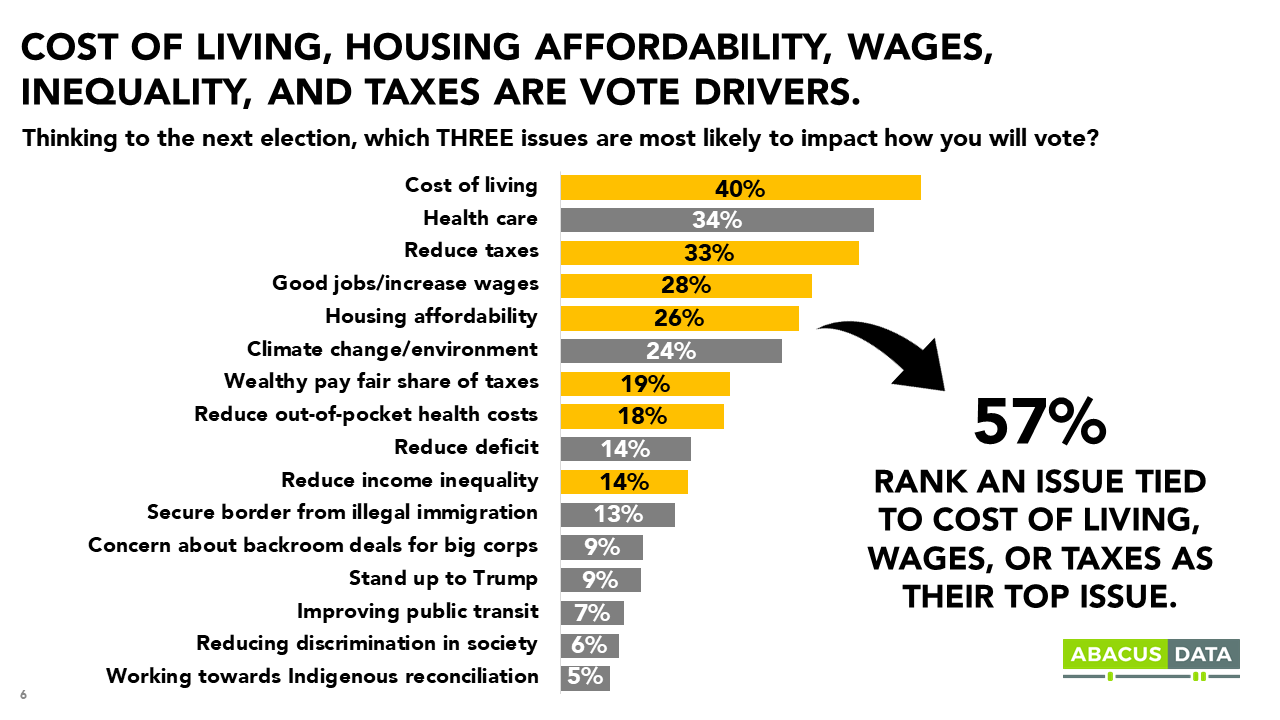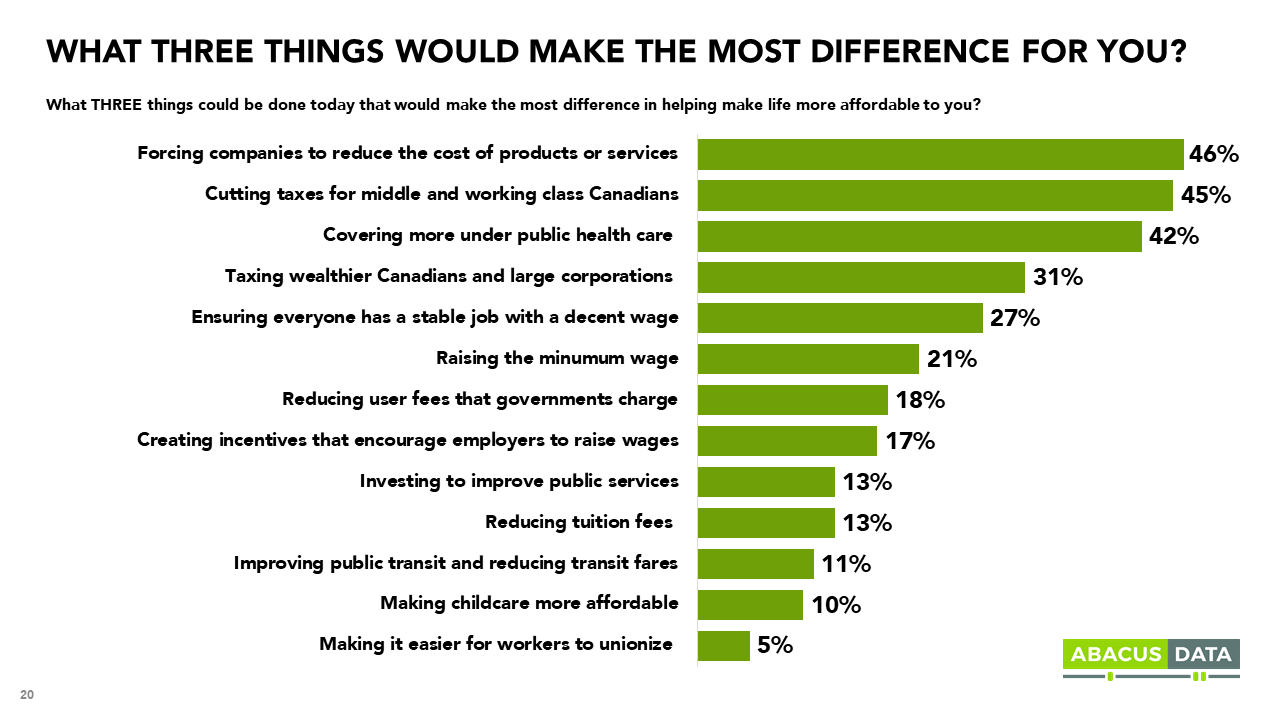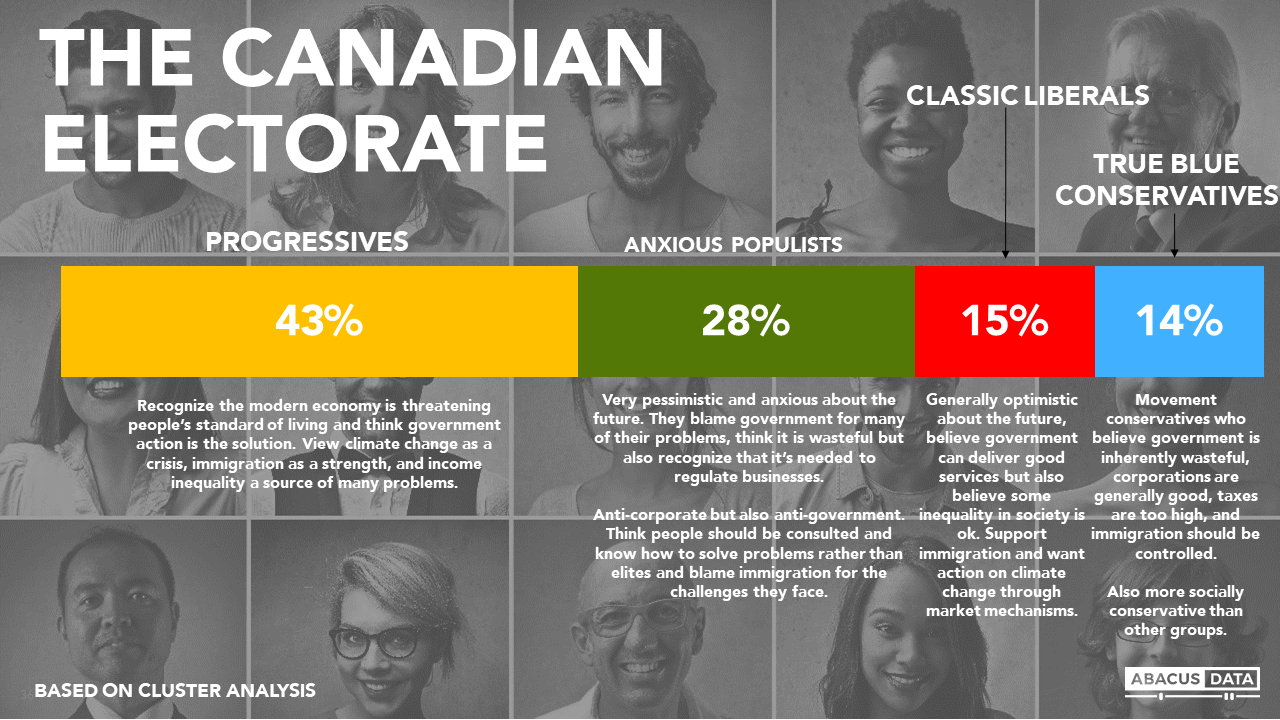Memo: What our polling on affordability anxiety for the Broadbent Institute means for progressives in Canada
March 28, 2019
Memorandum
To: Broadbent Institute
From: David Coletto, Abacus Data
Re: What our polling on affordability anxiety means for progressives in Canada
In a world where big issues – like action on climate change, immigration, fiscal policy, and foreign affairs – divide populations, there is a common concern among people that life is increasingly unaffordable, that income and wages are not keeping pace with rising prices leading to anxiety about whether the standard of living we have come to expect can be reached today and in the future.
This anxiety seems to be growing and fueling the rise of populist political movements – both on the left and right – which are responding to the pressure and frustration people are feeling.
This memorandum is intended to offer a perspective on the results obtained in our survey for the Broadbent Institute exploring public attitudes, perceptions, and opinion about affordability, cost of living, and income equality in Canada.
What follows is my own perspective on the data that is influenced by my more than 15 years exploring public opinion in Canada.
• There is a high level of affordability anxiety in Canada. Financial insecurity – whether the cost of living, housing affordability, or income inequality – are clearly a primary concern for most Canadians.
• These concerns are not isolated to a certain region of the country, among a specific demographic group, or one political tribe, but are broadly felt across groups. Those with lower household incomes are more likely to express concern about their cost of living but overall, 57% of Canadians we surveyed report that an issue related to cost of living, taxes, housing affordability, wages, or income inequality is the TOP issue that they feel will determine their vote in the upcoming federal election.

• Among those who worry about their rising cost of living, most report that their costs are rising and income differences between themselves and the rich have gotten worse over the past few years. Almost half say their ability to save for retirement, feelings of stress about money, and their ability to cover day-to-day expenses are worse than a few years back.
• At the same time, only 1 in 4 thinks corporate profits have been hurt. Most think that profits for big corporations have improved or stayed about the same over the past few years. This perception gap – between how people are feeling personally and how they think the rich and large corporations are doing – is fueling the angst we see in the data.
One of the primary questions our study sought to explore is what side of the affordability equation – income or expenses – does the public believe is a greater contributor to the affordability crisis.
The results suggest a bias exists towards controlling costs instead of rising wages or incomes. This helps explain the attraction to policy proposals that seek to reduce costs while forgoing efforts to raise wages.
For example, when we offer a simple choice to respondents – lowering costs or raising wages – and ask which will make life more affordable for Canadians, over six in ten choose lowering costs. Lower costs of everyday goods and services win out across demographic, socio-economic, and political groups.

The public recognizes that there’s no silver bullet to raising living standards for all people. Many recognize that job security and fair wages, cutting taxes for middle and working class Canadians, and expanding public services, especially in health care, would help a lot in making life more affordable.
At the same time, folks also feel that forcing companies to reduce the cost of products or services or taxing wealthier Canadians and large corporations to pay for better services would also help in making life affordable. There’s a broad appeal for government intervention in the market and an expectation that doing so will improve relieve some of the affordability anxiety.
But there’s a big flashing caution sign here for corporate Canada: if wages don’t rise as fast as costs, the pressure on governments to regulate, intervene, and force change will grow. 46% of Canadians believe that forcing companies to reduce the cost of products and services is one of the three things that would make the most difference in making their life more affordable. That’s a lot of political cover for enterprising politicians to propose regulating the cost of things we use day-to-day.

But perhaps most concerning, and the key conclusion of this study is that the data points to a clear relationship between anxiety about the cost of living and opinions about other issues.
Those who worry about the cost of living are more likely to:
• Feel that the way the economy is going will present more threats to their quality of life in the future than opportunities to improve it (by 21 points!).
• Feel that government is almost always wasteful and inefficient.
• Think the rich in Canada don’t pay enough taxes.
• Believe immigrants today are a burden on our country because they take our jobs, housing, and health care (17 points higher than those not worried about the cost of living).
• Feel that their children’s lives will be worse than their own.
In short, affordability anxiety causes people to feel like they are being left behind thanks to distrustful institutions who don’t have their interests in mind.
A feeling that their standard of living is being threatened causes them to look for people to blame. It creates anxiousness, causes irrational behaviour, and allows them to justify not prioritizing other important issues – like inequality, climate change, and collective action. It depletes social capital and isolates them from their neighbours. It stimulates demand for walls, not common ground.
Ultimately, the antidote for affordability anxiety is fairness and hope. It is about offering more certainty in an age of uncertainty. It’s about offering hope to an increasing number of Canadians who feel their standard of living – for them and their families – is under threat.
One reaction to affordability anxiety is to embrace political leaders who offer simple solutions to complex problems. If we reduce taxes here, cut some costs there, all our problems will go away. Let’s shelve plans to raise the minimum wage, make it harder for people to unionize, and turn a blind eye to the rising precarity of work today.
Business leaders can talk a lot about tax competitiveness, but if people ultimately feel threatened by change and squeezed by stagnating wages, there will be no room to debate tax competitiveness. Instead, the debate will focus on how to force businesses to relieve affordability anxiety.
But for progressives, the data in this survey points towards a way forward:
1. Don’t ignore or explain away the anxiety people are feeling. Embrace it and demonstrate that you understand. Prices may not be rising as quickly as many perceive. Instead of dismissing concerns or citing data contesting the perception, empathize with them. Show them you understand what they are going through. Show them you agree that we should all be fighting to maintain and improve living standards for all people.
2. Embrace progress and innovation in our economy but also stress the need for active government involvement managing the transition – to a clean economy, to a more autonomous workplace, to a more global world. By a 3 to 1 margin, Canadians feel threatened by the future economy and see few opportunities to improve their standard of living. With great change comes anxiety and disruption. Progressives can offer solutions that make change easier and more fair for all.
3. Investing in public services that people rely on and reversing the trend of cutbacks and delisted services needs to be a priority. Progressives have been on the defensive for decades – protecting gains made in the 1960s and 70s from decades of austerity and neo-liberal economic policy. It’s time to re-engage and offer big ideas to counter the tinkering of conservative leaders. Think New Green Deal, the expansion of public services, and nationalization of our common resources.
Around the world, progressives are fighting back against xenophobic, nationalist movements by being bold, audacious, and empathetic.
Jacinda Ardern, Bernie Sanders, Alexandria Ocasio-Cortez, Jeremy Corbin, and Andrés Manuel López Obrador are just a few examples of progressives who tapped into this affordability anxiety and are getting people to listen to their ideas and organize for change.
In Canada, our research confirms that we are still a primarily progressive country. As part of this study, we conducted a cluster analysis that produced four naturally occurring voter segments.
• 43% of Canadians are progressives. They recognize the modern economy is threatening but see government action as a solution. They think climate change is a crisis, immigration is a strength, and income inequality is a source of affordability anxiety.
• 15% are classic liberals. They are more optimistic about the future economy, believe government can deliver some services but also believe some inequality in society is ok. They are pro-immigration and want action on climate change, but usually through market-based mechanisms.
• 14% are true-blue conservatives. These are movement conservatives who believe the government is inherently wasteful, corporations are generally good, taxes are too high, and immigration should be controlled.
• The remaining 28% are what I term, anxious populists. They are very pessimistic and anxious about the future. They are highly distrustful of elites and institutions (government and corporations) but also recognize the need for government to regulate the market. 94% think the rich in Canada don’t pay enough taxes.

Ultimately, anxious populists will have a big influence on the outcome of the next election. They are the least partisan and most persuadable group.
In 2015, 36% voted for Stephen Harper and the Conservatives while 35% voted Liberal and 21% voted NDP. In 2015, 65% voted for a progressive-oriented political party. Today only 44% would.
Almost half of the anxious populists would vote Conservative (46%, up 12) with the Liberal vote share among this group down 19-points to only 16%. The NDP performs only marginally better at 18%. It’s clear the right in Canada is winning them over by preaching affordability and pointing to issues like immigration that fuel anxiety.
Winning over these anxious populists who have the greatest level of affordability anxiety should be a priority for every progressive leader in Canada.
To do so, the affordability equation has to shift. The focus has to be on how policy and government can raise wages, decrease income and wealth inequality, and ultimately convince people that while the future is uncertain and change is inevitable, people don’t need to be left behind.



